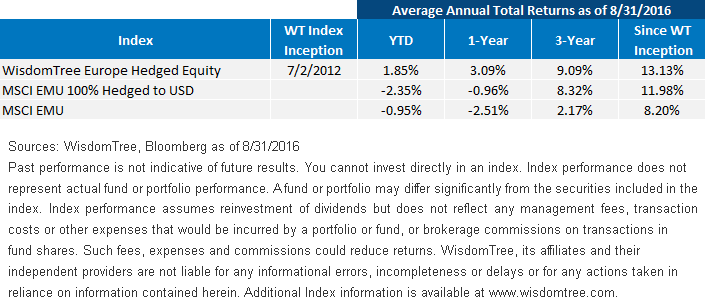Getting Smarter in Your European Allocation



 Besides the fact that the WisdomTree Europe Hedged Equity Index only selects dividend payers and weights them by their share of dividends paid, we believe the exporter tilt embedded in WisdomTree’s Index methodology has contributed to the historical outperformance. Requiring that companies within the Index generate at least 50% of their revenue from outside Europe, we believe, has three natural benefits:
1) A Stronger Connection to Global Growth
At a time when global growth seems to be outpacing that of Europe, tilting toward companies that derive at least 50% of their revenue globally gives the WisdomTree Index, we believe, an advantage over market cap-weighted indexes. With these companies’ revenue streams being less affected by slowdowns in domestic demand, they may provide a better alternative when global gross domestic product (GDP) growth advances faster than growth within Europe. We estimate that approximately one-third of the revenue from the constituents of the WisdomTree Europe Hedged Equity Index comes from Europe. Emerging markets make up an equal contribution of revenue, and a rebound in stocks in emerging markets is supporting related exposures in Europe.
2) Differentiated Sector Bets (Under-Weight in Financials)
An important aspect of tilting toward exporters is the differentiated sector weights that result, compared to the MSCI EMU Index. The WisdomTree Index is currently over-weight in such sectors as Consumer Staples, Consumer Discretionary and Industrials. At the same time, the exporter tilt causes a significant under-weight in the Financials sector relative to cap weighting. Through 2016, we have seen this under-weight in Financials average roughly 8%. The WisdomTree Index has 0% exposure to Italian banks versus the 2% allocated by the MSCI EMU Index. To put the significance of these under-weights into perspective, year-to-date, European financials are down 14%, while Italian financials are down 37% measured in euros. Because the WisdomTree Index rebalances annually back to the dividends companies pay, rather than their market value, WisdomTree’s rules-based methodology also holds out the potential to rebalance back to where the relative value may be, across the sectors and countries within the eurozone.
3) A Hedged Index That Tilts toward Exporters
Finally, we believe that currency-hedged indexes that tilt toward companies that stand to benefit from a depreciating currency intuitively make a lot of sense. What is comforting is that even in a year when the euro has appreciated against the U.S. dollar, the stock and sector “bets” made by the WisdomTree methodology have managed to generate enough alpha to outperform even the MSCI EMU Index, which has benefited from the appreciation of the euro in 2016. Should the dollar strengthen against the euro from this point forward—either because the Federal Reserve raises interest rates, or the ECB expands its program of monetary easing in the future—the fact that the WisdomTree Hedged Equity Index hedges out foreign currency exposure could serve as another source of relative return.
Conclusion
With reports that European growth and sentiment is stalling, we believe that long-term investors in Europe should use this occasion to tilt their allocations toward European multinationals better positioned to capitalize on global growth and a depreciating euro. While future movements in the European currency are hard to predict, our research suggests that taking currency risk in Europe is not advised over longer-term holding periods. Put another way, currency exposure in Europe is a source of risk with no expected long-term return. For investors wanting to learn more about the ETF tracking the WisdomTree Europe Hedged Equity Index, the WisdomTree Europe Hedged Equity Fund (HEDJ), click here.
Unless otherwise noted, data source is Bloomberg, as of 8/31/2016.
Besides the fact that the WisdomTree Europe Hedged Equity Index only selects dividend payers and weights them by their share of dividends paid, we believe the exporter tilt embedded in WisdomTree’s Index methodology has contributed to the historical outperformance. Requiring that companies within the Index generate at least 50% of their revenue from outside Europe, we believe, has three natural benefits:
1) A Stronger Connection to Global Growth
At a time when global growth seems to be outpacing that of Europe, tilting toward companies that derive at least 50% of their revenue globally gives the WisdomTree Index, we believe, an advantage over market cap-weighted indexes. With these companies’ revenue streams being less affected by slowdowns in domestic demand, they may provide a better alternative when global gross domestic product (GDP) growth advances faster than growth within Europe. We estimate that approximately one-third of the revenue from the constituents of the WisdomTree Europe Hedged Equity Index comes from Europe. Emerging markets make up an equal contribution of revenue, and a rebound in stocks in emerging markets is supporting related exposures in Europe.
2) Differentiated Sector Bets (Under-Weight in Financials)
An important aspect of tilting toward exporters is the differentiated sector weights that result, compared to the MSCI EMU Index. The WisdomTree Index is currently over-weight in such sectors as Consumer Staples, Consumer Discretionary and Industrials. At the same time, the exporter tilt causes a significant under-weight in the Financials sector relative to cap weighting. Through 2016, we have seen this under-weight in Financials average roughly 8%. The WisdomTree Index has 0% exposure to Italian banks versus the 2% allocated by the MSCI EMU Index. To put the significance of these under-weights into perspective, year-to-date, European financials are down 14%, while Italian financials are down 37% measured in euros. Because the WisdomTree Index rebalances annually back to the dividends companies pay, rather than their market value, WisdomTree’s rules-based methodology also holds out the potential to rebalance back to where the relative value may be, across the sectors and countries within the eurozone.
3) A Hedged Index That Tilts toward Exporters
Finally, we believe that currency-hedged indexes that tilt toward companies that stand to benefit from a depreciating currency intuitively make a lot of sense. What is comforting is that even in a year when the euro has appreciated against the U.S. dollar, the stock and sector “bets” made by the WisdomTree methodology have managed to generate enough alpha to outperform even the MSCI EMU Index, which has benefited from the appreciation of the euro in 2016. Should the dollar strengthen against the euro from this point forward—either because the Federal Reserve raises interest rates, or the ECB expands its program of monetary easing in the future—the fact that the WisdomTree Hedged Equity Index hedges out foreign currency exposure could serve as another source of relative return.
Conclusion
With reports that European growth and sentiment is stalling, we believe that long-term investors in Europe should use this occasion to tilt their allocations toward European multinationals better positioned to capitalize on global growth and a depreciating euro. While future movements in the European currency are hard to predict, our research suggests that taking currency risk in Europe is not advised over longer-term holding periods. Put another way, currency exposure in Europe is a source of risk with no expected long-term return. For investors wanting to learn more about the ETF tracking the WisdomTree Europe Hedged Equity Index, the WisdomTree Europe Hedged Equity Fund (HEDJ), click here.
Unless otherwise noted, data source is Bloomberg, as of 8/31/2016.Important Risks Related to this Article
There are risks associated with investing, including possible loss of principal. Foreign investing involves special risks, such as risk of loss from currency fluctuation or political or economic uncertainty. Investments in currency involve additional special risks, such as credit risk and interest rate fluctuations. Derivative investments can be volatile, and these investments may be less liquid than other securities, and more sensitive to the effect of varied economic conditions. As this Fund can have a high concentration in some issuers, the Fund can be adversely impacted by changes affecting those issuers. Due to the investment strategy of this Fund, it may make higher capital gain distributions than other ETFs. Please read the Fund’s prospectus for specific details regarding the Fund’s risk profile.
Hedging can help returns when a foreign currency depreciates against the U.S. dollar, but can hurt when the foreign currency appreciates against the U.S. dollar.
Dividends are not guaranteed, and a company currently paying dividends may cease paying dividends at any time.



